高中英语外研版(2019)必修三 Unit 6 Period 3 学案
文档属性
| 名称 | 高中英语外研版(2019)必修三 Unit 6 Period 3 学案 |
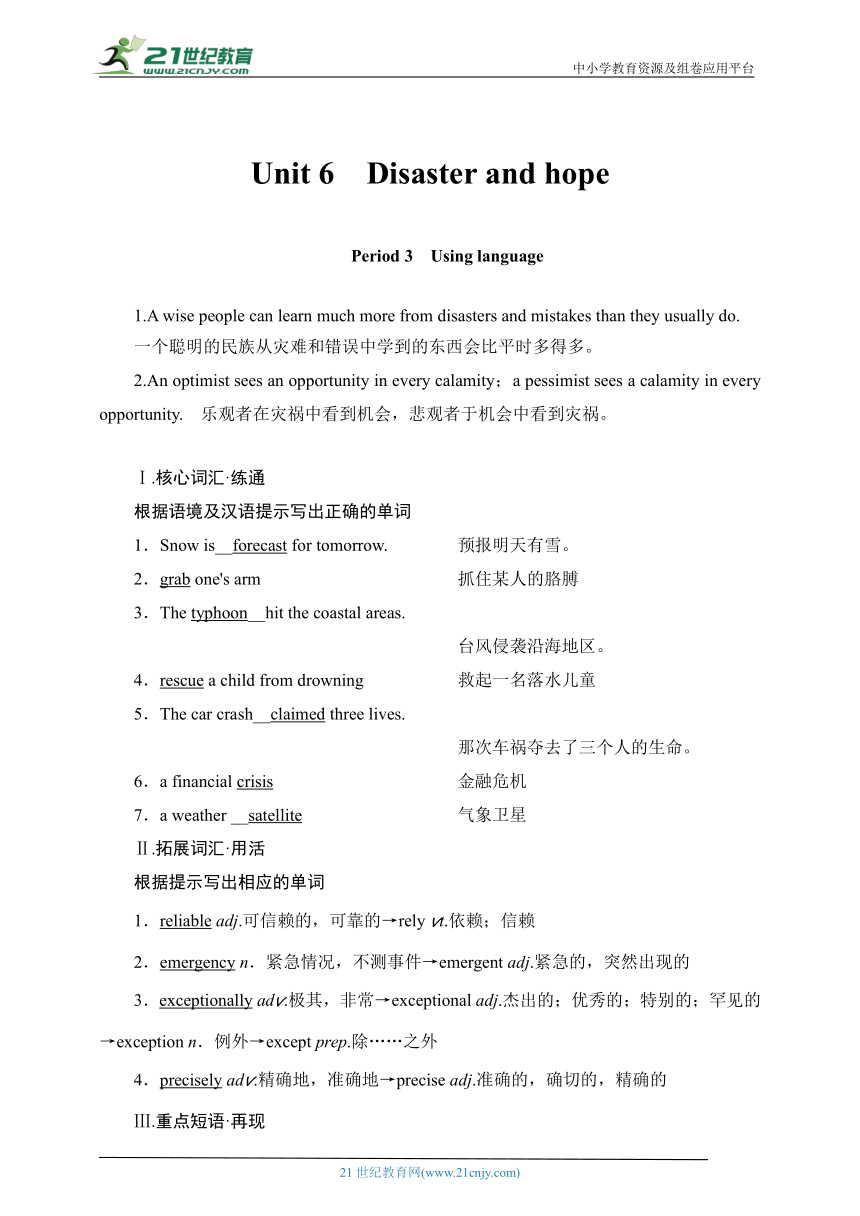
|
|
| 格式 | doc | ||
| 文件大小 | 1.3MB | ||
| 资源类型 | 试卷 | ||
| 版本资源 | 外研版(2019) | ||
| 科目 | 英语 | ||
| 更新时间 | 2022-12-05 00:00:00 | ||
图片预览

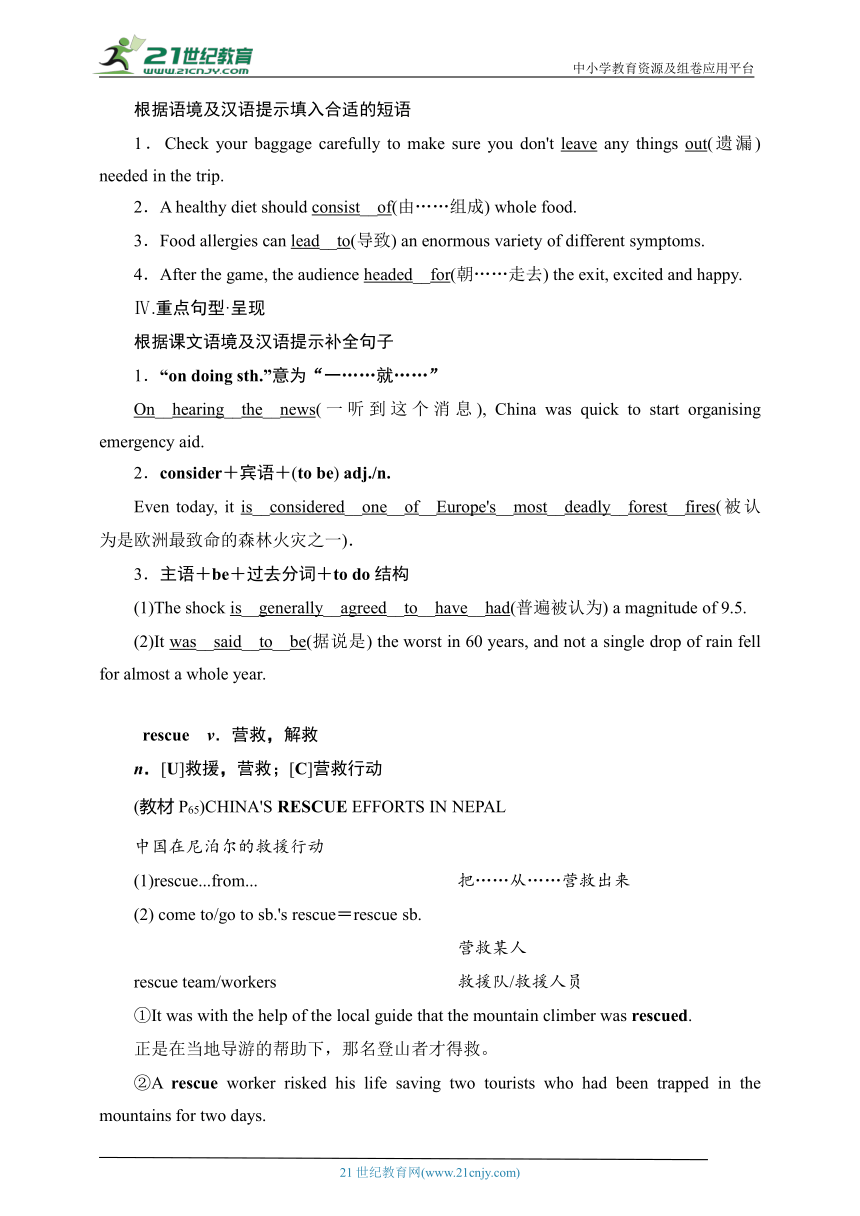
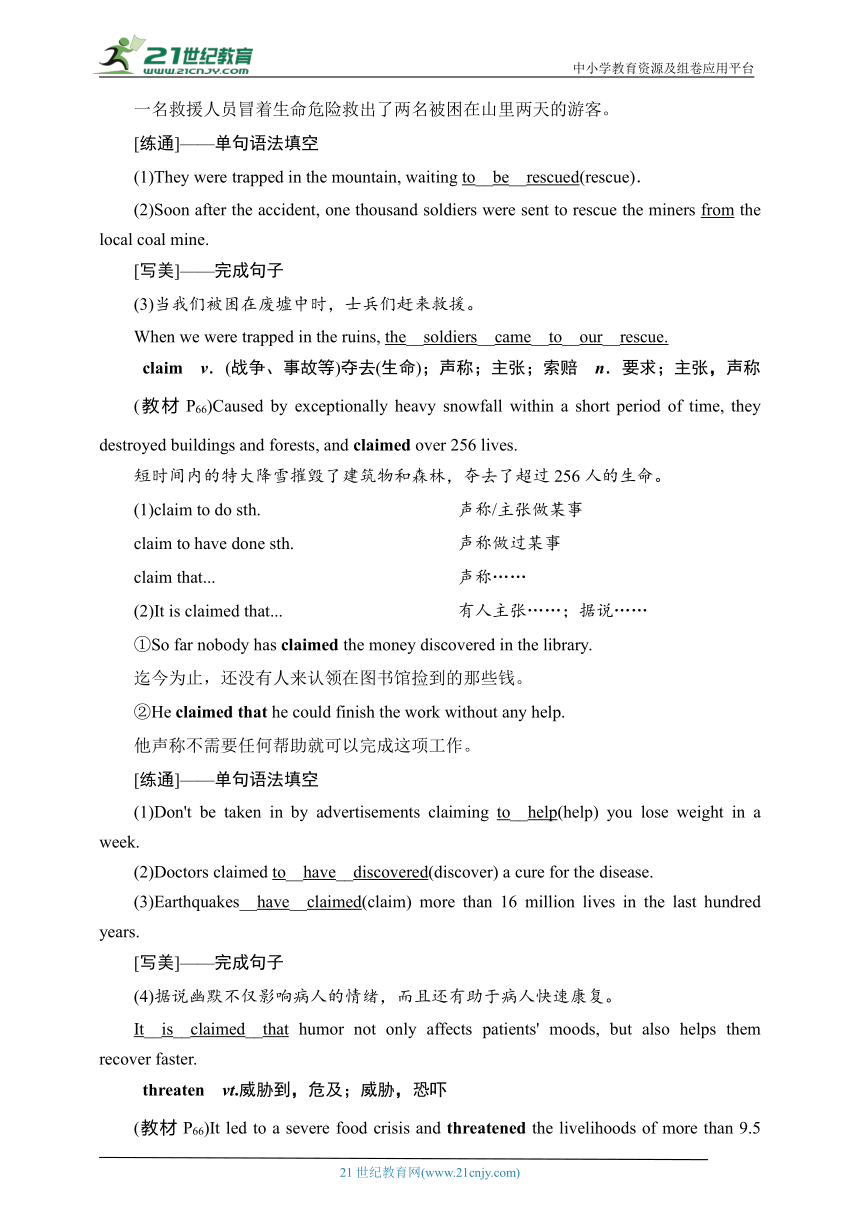
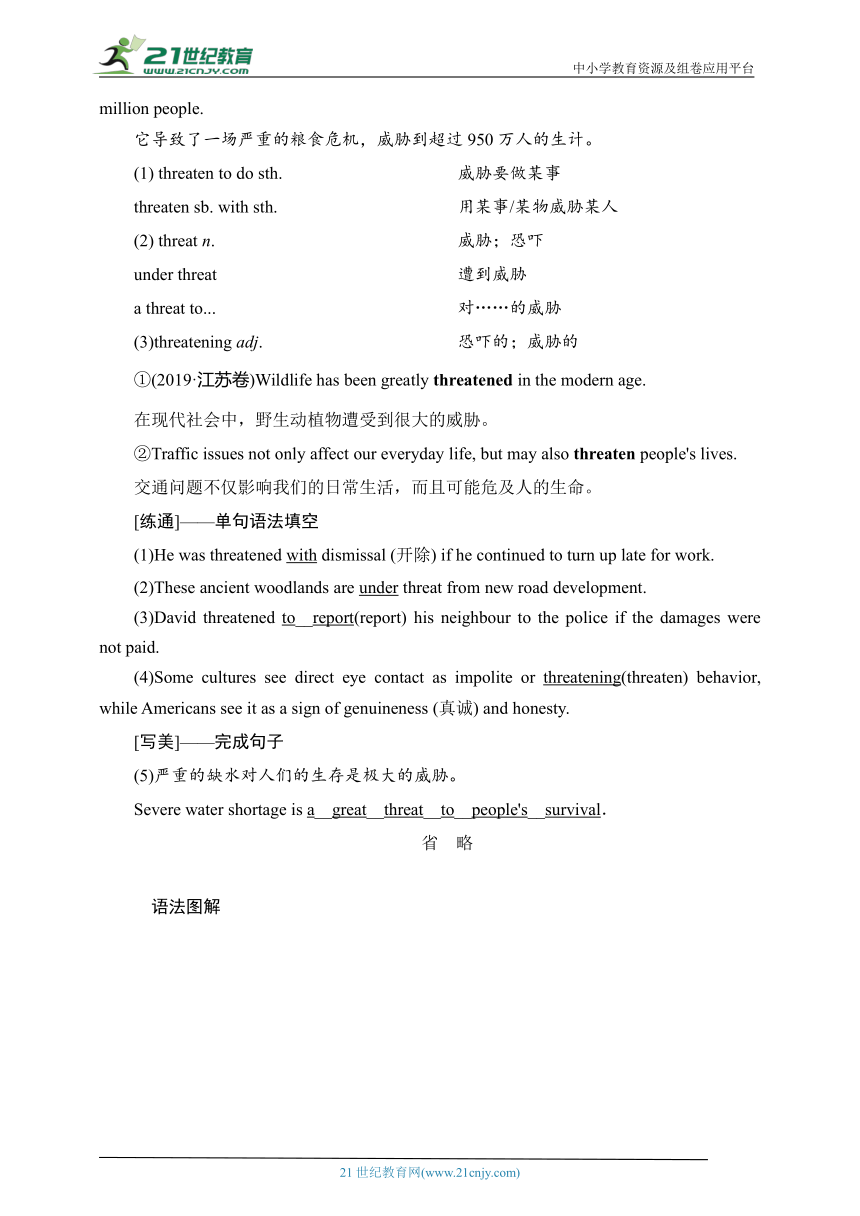
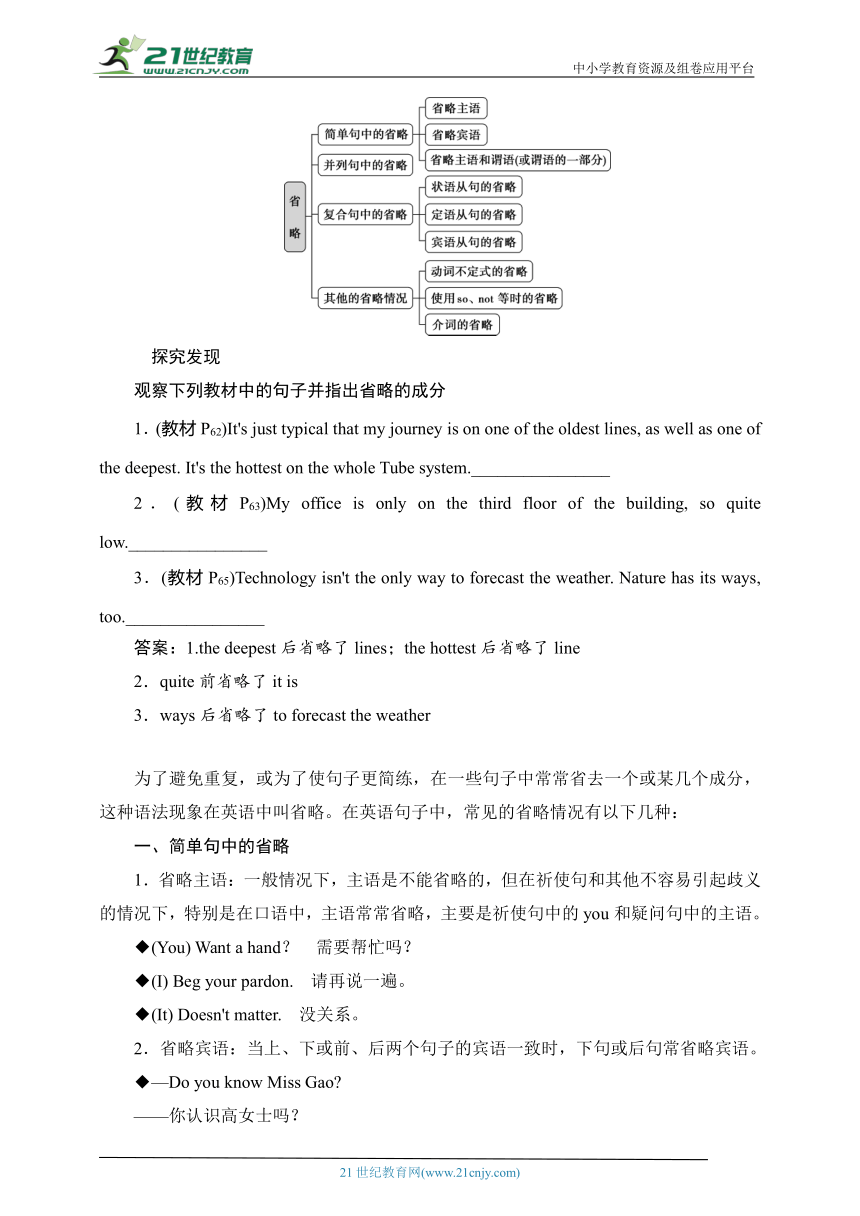
文档简介
中小学教育资源及组卷应用平台
Unit 6 Disaster and hope
Period 3 Using language
1.A wise people can learn much more from disasters and mistakes than they usually do.
一个聪明的民族从灾难和错误中学到的东西会比平时多得多。
2.An optimist sees an opportunity in every calamity;a pessimist sees a calamity in every opportunity. 乐观者在灾祸中看到机会,悲观者于机会中看到灾祸。
Ⅰ.核心词汇·练通
根据语境及汉语提示写出正确的单词
1.Snow is__forecast for tomorrow. 预报明天有雪。
2.grab one's arm 抓住某人的胳膊
3.The typhoon__hit the coastal areas.
台风侵袭沿海地区。
4.rescue a child from drowning 救起一名落水儿童
5.The car crash__claimed three lives.
那次车祸夺去了三个人的生命。
6.a financial crisis 金融危机
7.a weather __satellite 气象卫星
Ⅱ.拓展词汇·用活
根据提示写出相应的单词
1.reliable adj.可信赖的,可靠的→rely vt.依赖;信赖
2.emergency n.紧急情况,不测事件→emergent adj.紧急的,突然出现的
3.exceptionally adv.极其,非常→exceptional adj.杰出的;优秀的;特别的;罕见的→exception n.例外→except prep.除……之外
4.precisely adv.精确地,准确地→precise adj.准确的,确切的,精确的
Ⅲ.重点短语·再现
根据语境及汉语提示填入合适的短语
1.Check your baggage carefully to make sure you don't leave any things out(遗漏) needed in the trip.
2.A healthy diet should consist__of(由……组成) whole food.
3.Food allergies can lead__to(导致) an enormous variety of different symptoms.
4.After the game, the audience headed__for(朝……走去) the exit, excited and happy.
Ⅳ.重点句型·呈现
根据课文语境及汉语提示补全句子
1.“on doing sth.”意为“一……就……”
On__hearing__the__news(一听到这个消息), China was quick to start organising emergency aid.
2.consider+宾语+(to be) adj./n.
Even today, it is__considered__one__of__Europe's__most__deadly__forest__fires(被认为是欧洲最致命的森林火灾之一).
3.主语+be+过去分词+to do结构
(1)The shock is__generally__agreed__to__have__had(普遍被认为) a magnitude of 9.5.
(2)It was__said__to__be(据说是) the worst in 60 years, and not a single drop of rain fell for almost a whole year.
rescue v.营救,解救
n.[U]救援,营救;[C]营救行动
(教材P65)CHINA'S RESCUE EFFORTS IN NEPAL
中国在尼泊尔的救援行动
(1)rescue...from... 把……从……营救出来
(2) come to/go to sb.'s rescue=rescue sb.
营救某人
rescue team/workers 救援队/救援人员
①It was with the help of the local guide that the mountain climber was rescued.
正是在当地导游的帮助下,那名登山者才得救。
②A rescue worker risked his life saving two tourists who had been trapped in the mountains for two days.
一名救援人员冒着生命危险救出了两名被困在山里两天的游客。
[练通]——单句语法填空
(1)They were trapped in the mountain, waiting to__be__rescued(rescue).
(2)Soon after the accident, one thousand soldiers were sent to rescue the miners from the local coal mine.
[写美]——完成句子
(3)当我们被困在废墟中时,士兵们赶来救援。
When we were trapped in the ruins, the__soldiers__came__to__our__rescue.
claim v.(战争、事故等)夺去(生命);声称;主张;索赔 n.要求;主张,声称
(教材P66)Caused by exceptionally heavy snowfall within a short period of time, they destroyed buildings and forests, and claimed over 256 lives.
短时间内的特大降雪摧毁了建筑物和森林,夺去了超过256人的生命。
(1)claim to do sth. 声称/主张做某事
claim to have done sth. 声称做过某事
claim that... 声称……
(2)It is claimed that... 有人主张……;据说……
①So far nobody has claimed the money discovered in the library.
迄今为止,还没有人来认领在图书馆捡到的那些钱。
②He claimed that he could finish the work without any help.
他声称不需要任何帮助就可以完成这项工作。
[练通]——单句语法填空
(1)Don't be taken in by advertisements claiming to__help(help) you lose weight in a week.
(2)Doctors claimed to__have__discovered(discover) a cure for the disease.
(3)Earthquakes__have__claimed(claim) more than 16 million lives in the last hundred years.
[写美]——完成句子
(4)据说幽默不仅影响病人的情绪,而且还有助于病人快速康复。
It__is__claimed__that humor not only affects patients' moods, but also helps them recover faster.
threaten vt.威胁到,危及;威胁,恐吓
(教材P66)It led to a severe food crisis and threatened the livelihoods of more than 9.5 million people.
它导致了一场严重的粮食危机,威胁到超过950万人的生计。
(1) threaten to do sth. 威胁要做某事
threaten sb. with sth. 用某事/某物威胁某人
(2) threat n. 威胁;恐吓
under threat 遭到威胁
a threat to... 对……的威胁
(3)threatening adj. 恐吓的;威胁的
①(2019·江苏卷)Wildlife has been greatly threatened in the modern age.
在现代社会中,野生动植物遭受到很大的威胁。
②Traffic issues not only affect our everyday life, but may also threaten people's lives.
交通问题不仅影响我们的日常生活,而且可能危及人的生命。
[练通]——单句语法填空
(1)He was threatened with dismissal (开除) if he continued to turn up late for work.
(2)These ancient woodlands are under threat from new road development.
(3)David threatened to__report(report) his neighbour to the police if the damages were not paid.
(4)Some cultures see direct eye contact as impolite or threatening(threaten) behavior, while Americans see it as a sign of genuineness (真诚) and honesty.
[写美]——完成句子
(5)严重的缺水对人们的生存是极大的威胁。
Severe water shortage is a__great__threat__to__people's__survival.
省 略
?语法图解
?探究发现
观察下列教材中的句子并指出省略的成分
1.(教材P62)It's just typical that my journey is on one of the oldest lines, as well as one of the deepest. It's the hottest on the whole Tube system.________________
2.(教材P63)My office is only on the third floor of the building, so quite low.________________
3.(教材P65)Technology isn't the only way to forecast the weather. Nature has its ways, too.________________
答案:1.the deepest后省略了lines;the hottest后省略了line
2.quite前省略了it is
3.ways后省略了to forecast the weather
为了避免重复,或为了使句子更简练,在一些句子中常常省去一个或某几个成分,这种语法现象在英语中叫省略。在英语句子中,常见的省略情况有以下几种:
一、简单句中的省略
1.省略主语:一般情况下,主语是不能省略的,但在祈使句和其他不容易引起歧义的情况下,特别是在口语中,主语常常省略,主要是祈使句中的you和疑问句中的主语。
◆(You) Want a hand? 需要帮忙吗?
◆(I) Beg your pardon. 请再说一遍。
◆(It) Doesn't matter. 没关系。
2.省略宾语:当上、下或前、后两个句子的宾语一致时,下句或后句常省略宾语。
◆—Do you know Miss Gao
——你认识高女士吗?
—I don't know (her).
——不认识。
3.省略主语和谓语(或谓语的一部分):在某些具体的场合下,主语和谓语都很明确,此时为了简化或显得亲切等,可将主语和谓语(或谓语的一部分)同时省略,只剩下表语、宾语、状语或其他成分。
◆(You come) This way, please.
请这边走。(省略了主语和谓语)
◆(Have you) Got any ink
你有墨水吗?(省略了主语和谓语的一部分)
[即时演练1]——补全下列省略句
(1)Have a seat, please!
You__have__a__seat,__please!
(2)Looks like rain.
It__looks__like__rain.
(3)Let's do the dishes. I'll wash and you dry.
Let's__do__the__dishes.__I'll__wash__the__dishes__and__you__dry__them/the__dishes.
(4)Got any idea about the plan
Have__you__got__any__idea__about__the__plan
二、并列句中的省略
在由and或but连接的并列句中,常省略一些重复的词或词组。
1.省略共同的主语或宾语。
◆Tom picked up a book on the floor and (Tom) handed it to the teacher.
汤姆在地板上捡起了一本书,并把它交给了老师。
2.若主语不同,而谓语部分的系动词、助动词或情态动词相同,则省略后面的系动词、助动词或情态动词。
◆Jack must have been playing football and Mary (must have been) doing her homework.
杰克肯定一直在踢足球,玛丽肯定一直在做作业。
3.若主语与谓语动词相同,则省略后面的主谓成分。
◆His advice made me happy, but (his advice made) Jim angry.
他的建议使我高兴,却使吉姆生气。
4.若主语不同,但主要动词及后续部分相同,则省略主要动词及后续部分。
◆He has a knowledge of first aid but his friend doesn't (have a knowledge of first aid).
他具备急救知识,但他的朋友不具备。
[即时演练2]——写出下列句中可以省略的部分
(1)Some of us study Japanese, and others study English.
第二个study
(2)He gave up drinking several months, but he returned to his old way later.
but后的he
(3)My friend didn't come to school, but I wonder why he didn't come to school.
why后的he__didn't__come__to__school
三、复合句中的省略
1.状语从句的省略
(1)在when、while、if、as if、though、although、as、until、once、whether、unless、whenever等连接的状语从句中,当从句主语与主句主语相同,且从句谓语中含有系动词be或从句的主语为it时,则从句中主语和be动词常被省略。
◆As (it is) scheduled, we participated in several instructive activities.
按照计划安排,我们参加了几个有指导意义的活动。
◆Look out for cars when (you are) crossing the street.
过马路时要当心汽车。
省略句中的谓语动词和主语之间构成主动关系,则使用现在分词;若构成被动关系,则使用过去分词;若谓语动词表示的动作尚未发生,则使用不定式。
(2)在than、as等引导的比较状语从句中常省略某些成分。
◆They don't use more water than (it is) necessary.
他们使用的水没有超出需要量。
◆He runs as fast as Bob (runs).
他和鲍勃跑得一样快。
并非所有的状语从句都可以省略主语和be动词,由after、before、because等词引导的状语从句一般要改写成介词短语等,用动名词代替be动词。
Because he was ill, he didn't attend the meeting.
→Because of being ill, he didn't attend the meeting.(正)
→Being ill, he didn't attend the meeting.(正)
→Because ill, he didn't attend the meeting.(误)
由于生病了,他没有出席会议。
2.定语从句的省略
(1)在限制性定语从句中作宾语的关系代词that、which、whom可省略。
◆The computer (which) I wanted to buy was sold out.
我想买的那种电脑卖光了。
(2)在定语从句中way作先行词,且在句中充当方式状语时,可省略引导定语从句的关系代词。
◆I don't like the way (that) he speaks to me.
我不喜欢他对我说话的方式。
(3)在以“the same...as...”或such as引导的定语从句中,也可省略与主句相同的部分。
◆I have the same trouble as you (have).
我和你有同样的困难。
3.宾语从句的省略
(1)及物动词后接宾语从句时,连接词that一般可以省略;但如果及物动词接两个或两个以上that引导的宾语从句,那么只有第一个that可以省略。
◆I do believe (that) I am very qualified for this voluntary work, because I have a good command of spoken English.
我确信我适合这项志愿者工作,因为我精通英语口语。
◆He said (that) the text was very important and that we should learn it by heart.
他说这篇课文很重要,我们应该用心学习它。
(2)when、where、how和why引导的宾语从句有时可以仅保留引导词。
◆I know that a movie star will come to our city but I don't know when (he will come to our city).
我知道一个电影明星将要来我们市,但我不知道他什么时候来。
[即时演练3]——用所给词的适当形式填空
(1)When surfing(surf) the Internet, I downloaded the film.
(2)Video games can be a poor influence if left(leave) in the wrong hands.
(3)He shook his head as if to__say(say) “no”.
[即时演练4]——写出下列句中可以省略的部分
(1)Among the many dangers which sailors have to face, probably the greatest of all is fog.which
(2)Please send us all the information that you have about the candidate for the position.that
(3)Jerry did not regret giving the comment but felt that he could have expressed it differently.that
四、其他的省略情况
1.动词不定式的省略
(1)当不定式在形容词afraid、anxious、eager、glad、happy、ready、willing等后作状语时,to后的内容常省略。
◆You can't force him to answer the question if he's not ready to (answer the question).
如果他不愿意回答这个问题,你不能强迫他。
(2)某些使役动词如make、let、have等,以及感官动词如see、watch、notice、observe、hear等后面作宾补的不定式须省略to;若这些动词用于被动语态,则to不能省略。
◆We often hear her sing an English song in the classroom.
→She is often heard to sing an English song in the classroom.(被动语态)
我们经常听见她在教室唱英文歌。
(3)并列的不定式可以省略后面的不定式符号to。但若两个不定式之间表示对比关系时,则不能省略to。
◆He likes to swim more than (to) skate.
比起溜冰,他更喜欢游泳。
◆He believes it important to study rather than to make friends.(比较)
他认为重要的是学习,而不是交朋友。
(4)当不定式在某些动词后作宾语时,常可省略to后的内容。常见的动词(短语)有agree、afford、expect、forget、hope、manage、pretend、remember、refuse、want、wish、would like等。
◆—Would you like to go to the cinema with me
——你愿意和我一起去看电影吗?
—I'd like to (go with you).
——我愿意。
(5)介词but、except前有实义动词do的某种形式时,后面的不定式不带to。
◆All he could do was nothing but wait.
他所能做的只有等待。
(6)当不定式在be going to、be able to、have to、ought to、used to后作复合谓语时,to后内容可省略。
◆They didn't visit their parents as much as they ought to (visit their parents).
他们应该多看望父母,但他们没有。
2.使用so、not等时的省略
为了避免重复前面所说过的内容,替代词so/not替代肯定或否定的名词性从句,与believe、do、expect、fear、guess、hope、say、speak、suppose、think、I'm afraid等连用。so表示赞同前述的内容,not表示不赞同前述的内容。
◆—Has she ever been to London
——她曾去过伦敦吗?
—I don't think so.(=I don't think she has ever been to London.)
——我想她没去过。
◆—Will it rain tomorrow
——明天会下雨吗?
—I hope not.(=I hope it won't rain tomorrow.)
——我希望不会。
3.介词的省略
(1)一些与动词、名词或形容词搭配的介词常常可以省略,而保留介词后的动名词。常见的结构有:
①have difficulty/trouble (in) doing sth.
②be busy (in) doing sth.
③spend some time (in) doing sth.
④stop/prevent sb. (from) doing sth.
◆The heavy rain prevented him (from) arriving there on time.
大雨使得他没能按时到达那里。
(2)表示时间的介词at、on和in在next、last、this、these、yesterday、tomorrow、one、any、every、each、some等词之前时,一般可以省略。
◆We go to school (on) every day except Sundays.
除了星期天之外,我们每天都去上学。
[即时演练5]——用省略结构完成句子
(1)我让他去外面吃,但他不想去。
I asked him to eat out, but he__didn't__want__to.
(2)——你愿意参加这个游戏吗?
—Will you join the game
——我愿意。
—I'd__be__glad__to.
(3)——你今天能完成工作吗?
—Can you finish your work today
——我认为能。
—I__think__so.
(4)我真不知道该怎么想怎么说。
I'm really puzzled what__to__think__or__say.
Ⅰ.将下列句子改写成省略句
1.The burn that she got from the iron was red and it was very painful.
→The burn she__got__from__the__iron was red and very__painful.
2.Just take a short break if you are tired.
→Just take a short break if__tired.
3.Only some of the students have done a first aid course but most of the students haven't done a first aid course.
→Only some of the students have done a first aid course but most__haven't.
4.John will go abroad to travel but his brother will not go abroad to travel.
→John will go abroad to travel but his__brother__will__not.
5.She stood at the gate as if she was waiting for someone.
→She stood at the gate as__if__waiting__for__someone.
Ⅱ.语法与写作(使用省略结构)
1.除非邀请你发言,否则你应该在这次会议上保持沉默。
Unless__invited__to__speak,__you should remain silent at the conference.
2.亨利通过期末考试的可能性很小,但他仍希望通过。
Henry is less likely to pass the end of term exam, but he still hopes__to.
3.除了整天看书,我无事可做。
I have__nothing__to__do__but__read books.
4.如果你不参加明天的开幕式,我也不去了。
If you don't attend the opening ceremony tomorrow,neither/nor__will__I.
5.让我惊讶的是,我儿子的作业比预期完成得要好。
To my surprise, my son finished his homework better__than__expected.
21世纪教育网 www.21cnjy.com 精品试卷·第 2 页 (共 2 页)
HYPERLINK "http://www.21cnjy.com/" 21世纪教育网(www.21cnjy.com)
Unit 6 Disaster and hope
Period 3 Using language
1.A wise people can learn much more from disasters and mistakes than they usually do.
一个聪明的民族从灾难和错误中学到的东西会比平时多得多。
2.An optimist sees an opportunity in every calamity;a pessimist sees a calamity in every opportunity. 乐观者在灾祸中看到机会,悲观者于机会中看到灾祸。
Ⅰ.核心词汇·练通
根据语境及汉语提示写出正确的单词
1.Snow is__forecast for tomorrow. 预报明天有雪。
2.grab one's arm 抓住某人的胳膊
3.The typhoon__hit the coastal areas.
台风侵袭沿海地区。
4.rescue a child from drowning 救起一名落水儿童
5.The car crash__claimed three lives.
那次车祸夺去了三个人的生命。
6.a financial crisis 金融危机
7.a weather __satellite 气象卫星
Ⅱ.拓展词汇·用活
根据提示写出相应的单词
1.reliable adj.可信赖的,可靠的→rely vt.依赖;信赖
2.emergency n.紧急情况,不测事件→emergent adj.紧急的,突然出现的
3.exceptionally adv.极其,非常→exceptional adj.杰出的;优秀的;特别的;罕见的→exception n.例外→except prep.除……之外
4.precisely adv.精确地,准确地→precise adj.准确的,确切的,精确的
Ⅲ.重点短语·再现
根据语境及汉语提示填入合适的短语
1.Check your baggage carefully to make sure you don't leave any things out(遗漏) needed in the trip.
2.A healthy diet should consist__of(由……组成) whole food.
3.Food allergies can lead__to(导致) an enormous variety of different symptoms.
4.After the game, the audience headed__for(朝……走去) the exit, excited and happy.
Ⅳ.重点句型·呈现
根据课文语境及汉语提示补全句子
1.“on doing sth.”意为“一……就……”
On__hearing__the__news(一听到这个消息), China was quick to start organising emergency aid.
2.consider+宾语+(to be) adj./n.
Even today, it is__considered__one__of__Europe's__most__deadly__forest__fires(被认为是欧洲最致命的森林火灾之一).
3.主语+be+过去分词+to do结构
(1)The shock is__generally__agreed__to__have__had(普遍被认为) a magnitude of 9.5.
(2)It was__said__to__be(据说是) the worst in 60 years, and not a single drop of rain fell for almost a whole year.
rescue v.营救,解救
n.[U]救援,营救;[C]营救行动
(教材P65)CHINA'S RESCUE EFFORTS IN NEPAL
中国在尼泊尔的救援行动
(1)rescue...from... 把……从……营救出来
(2) come to/go to sb.'s rescue=rescue sb.
营救某人
rescue team/workers 救援队/救援人员
①It was with the help of the local guide that the mountain climber was rescued.
正是在当地导游的帮助下,那名登山者才得救。
②A rescue worker risked his life saving two tourists who had been trapped in the mountains for two days.
一名救援人员冒着生命危险救出了两名被困在山里两天的游客。
[练通]——单句语法填空
(1)They were trapped in the mountain, waiting to__be__rescued(rescue).
(2)Soon after the accident, one thousand soldiers were sent to rescue the miners from the local coal mine.
[写美]——完成句子
(3)当我们被困在废墟中时,士兵们赶来救援。
When we were trapped in the ruins, the__soldiers__came__to__our__rescue.
claim v.(战争、事故等)夺去(生命);声称;主张;索赔 n.要求;主张,声称
(教材P66)Caused by exceptionally heavy snowfall within a short period of time, they destroyed buildings and forests, and claimed over 256 lives.
短时间内的特大降雪摧毁了建筑物和森林,夺去了超过256人的生命。
(1)claim to do sth. 声称/主张做某事
claim to have done sth. 声称做过某事
claim that... 声称……
(2)It is claimed that... 有人主张……;据说……
①So far nobody has claimed the money discovered in the library.
迄今为止,还没有人来认领在图书馆捡到的那些钱。
②He claimed that he could finish the work without any help.
他声称不需要任何帮助就可以完成这项工作。
[练通]——单句语法填空
(1)Don't be taken in by advertisements claiming to__help(help) you lose weight in a week.
(2)Doctors claimed to__have__discovered(discover) a cure for the disease.
(3)Earthquakes__have__claimed(claim) more than 16 million lives in the last hundred years.
[写美]——完成句子
(4)据说幽默不仅影响病人的情绪,而且还有助于病人快速康复。
It__is__claimed__that humor not only affects patients' moods, but also helps them recover faster.
threaten vt.威胁到,危及;威胁,恐吓
(教材P66)It led to a severe food crisis and threatened the livelihoods of more than 9.5 million people.
它导致了一场严重的粮食危机,威胁到超过950万人的生计。
(1) threaten to do sth. 威胁要做某事
threaten sb. with sth. 用某事/某物威胁某人
(2) threat n. 威胁;恐吓
under threat 遭到威胁
a threat to... 对……的威胁
(3)threatening adj. 恐吓的;威胁的
①(2019·江苏卷)Wildlife has been greatly threatened in the modern age.
在现代社会中,野生动植物遭受到很大的威胁。
②Traffic issues not only affect our everyday life, but may also threaten people's lives.
交通问题不仅影响我们的日常生活,而且可能危及人的生命。
[练通]——单句语法填空
(1)He was threatened with dismissal (开除) if he continued to turn up late for work.
(2)These ancient woodlands are under threat from new road development.
(3)David threatened to__report(report) his neighbour to the police if the damages were not paid.
(4)Some cultures see direct eye contact as impolite or threatening(threaten) behavior, while Americans see it as a sign of genuineness (真诚) and honesty.
[写美]——完成句子
(5)严重的缺水对人们的生存是极大的威胁。
Severe water shortage is a__great__threat__to__people's__survival.
省 略
?语法图解
?探究发现
观察下列教材中的句子并指出省略的成分
1.(教材P62)It's just typical that my journey is on one of the oldest lines, as well as one of the deepest. It's the hottest on the whole Tube system.________________
2.(教材P63)My office is only on the third floor of the building, so quite low.________________
3.(教材P65)Technology isn't the only way to forecast the weather. Nature has its ways, too.________________
答案:1.the deepest后省略了lines;the hottest后省略了line
2.quite前省略了it is
3.ways后省略了to forecast the weather
为了避免重复,或为了使句子更简练,在一些句子中常常省去一个或某几个成分,这种语法现象在英语中叫省略。在英语句子中,常见的省略情况有以下几种:
一、简单句中的省略
1.省略主语:一般情况下,主语是不能省略的,但在祈使句和其他不容易引起歧义的情况下,特别是在口语中,主语常常省略,主要是祈使句中的you和疑问句中的主语。
◆(You) Want a hand? 需要帮忙吗?
◆(I) Beg your pardon. 请再说一遍。
◆(It) Doesn't matter. 没关系。
2.省略宾语:当上、下或前、后两个句子的宾语一致时,下句或后句常省略宾语。
◆—Do you know Miss Gao
——你认识高女士吗?
—I don't know (her).
——不认识。
3.省略主语和谓语(或谓语的一部分):在某些具体的场合下,主语和谓语都很明确,此时为了简化或显得亲切等,可将主语和谓语(或谓语的一部分)同时省略,只剩下表语、宾语、状语或其他成分。
◆(You come) This way, please.
请这边走。(省略了主语和谓语)
◆(Have you) Got any ink
你有墨水吗?(省略了主语和谓语的一部分)
[即时演练1]——补全下列省略句
(1)Have a seat, please!
You__have__a__seat,__please!
(2)Looks like rain.
It__looks__like__rain.
(3)Let's do the dishes. I'll wash and you dry.
Let's__do__the__dishes.__I'll__wash__the__dishes__and__you__dry__them/the__dishes.
(4)Got any idea about the plan
Have__you__got__any__idea__about__the__plan
二、并列句中的省略
在由and或but连接的并列句中,常省略一些重复的词或词组。
1.省略共同的主语或宾语。
◆Tom picked up a book on the floor and (Tom) handed it to the teacher.
汤姆在地板上捡起了一本书,并把它交给了老师。
2.若主语不同,而谓语部分的系动词、助动词或情态动词相同,则省略后面的系动词、助动词或情态动词。
◆Jack must have been playing football and Mary (must have been) doing her homework.
杰克肯定一直在踢足球,玛丽肯定一直在做作业。
3.若主语与谓语动词相同,则省略后面的主谓成分。
◆His advice made me happy, but (his advice made) Jim angry.
他的建议使我高兴,却使吉姆生气。
4.若主语不同,但主要动词及后续部分相同,则省略主要动词及后续部分。
◆He has a knowledge of first aid but his friend doesn't (have a knowledge of first aid).
他具备急救知识,但他的朋友不具备。
[即时演练2]——写出下列句中可以省略的部分
(1)Some of us study Japanese, and others study English.
第二个study
(2)He gave up drinking several months, but he returned to his old way later.
but后的he
(3)My friend didn't come to school, but I wonder why he didn't come to school.
why后的he__didn't__come__to__school
三、复合句中的省略
1.状语从句的省略
(1)在when、while、if、as if、though、although、as、until、once、whether、unless、whenever等连接的状语从句中,当从句主语与主句主语相同,且从句谓语中含有系动词be或从句的主语为it时,则从句中主语和be动词常被省略。
◆As (it is) scheduled, we participated in several instructive activities.
按照计划安排,我们参加了几个有指导意义的活动。
◆Look out for cars when (you are) crossing the street.
过马路时要当心汽车。
省略句中的谓语动词和主语之间构成主动关系,则使用现在分词;若构成被动关系,则使用过去分词;若谓语动词表示的动作尚未发生,则使用不定式。
(2)在than、as等引导的比较状语从句中常省略某些成分。
◆They don't use more water than (it is) necessary.
他们使用的水没有超出需要量。
◆He runs as fast as Bob (runs).
他和鲍勃跑得一样快。
并非所有的状语从句都可以省略主语和be动词,由after、before、because等词引导的状语从句一般要改写成介词短语等,用动名词代替be动词。
Because he was ill, he didn't attend the meeting.
→Because of being ill, he didn't attend the meeting.(正)
→Being ill, he didn't attend the meeting.(正)
→Because ill, he didn't attend the meeting.(误)
由于生病了,他没有出席会议。
2.定语从句的省略
(1)在限制性定语从句中作宾语的关系代词that、which、whom可省略。
◆The computer (which) I wanted to buy was sold out.
我想买的那种电脑卖光了。
(2)在定语从句中way作先行词,且在句中充当方式状语时,可省略引导定语从句的关系代词。
◆I don't like the way (that) he speaks to me.
我不喜欢他对我说话的方式。
(3)在以“the same...as...”或such as引导的定语从句中,也可省略与主句相同的部分。
◆I have the same trouble as you (have).
我和你有同样的困难。
3.宾语从句的省略
(1)及物动词后接宾语从句时,连接词that一般可以省略;但如果及物动词接两个或两个以上that引导的宾语从句,那么只有第一个that可以省略。
◆I do believe (that) I am very qualified for this voluntary work, because I have a good command of spoken English.
我确信我适合这项志愿者工作,因为我精通英语口语。
◆He said (that) the text was very important and that we should learn it by heart.
他说这篇课文很重要,我们应该用心学习它。
(2)when、where、how和why引导的宾语从句有时可以仅保留引导词。
◆I know that a movie star will come to our city but I don't know when (he will come to our city).
我知道一个电影明星将要来我们市,但我不知道他什么时候来。
[即时演练3]——用所给词的适当形式填空
(1)When surfing(surf) the Internet, I downloaded the film.
(2)Video games can be a poor influence if left(leave) in the wrong hands.
(3)He shook his head as if to__say(say) “no”.
[即时演练4]——写出下列句中可以省略的部分
(1)Among the many dangers which sailors have to face, probably the greatest of all is fog.which
(2)Please send us all the information that you have about the candidate for the position.that
(3)Jerry did not regret giving the comment but felt that he could have expressed it differently.that
四、其他的省略情况
1.动词不定式的省略
(1)当不定式在形容词afraid、anxious、eager、glad、happy、ready、willing等后作状语时,to后的内容常省略。
◆You can't force him to answer the question if he's not ready to (answer the question).
如果他不愿意回答这个问题,你不能强迫他。
(2)某些使役动词如make、let、have等,以及感官动词如see、watch、notice、observe、hear等后面作宾补的不定式须省略to;若这些动词用于被动语态,则to不能省略。
◆We often hear her sing an English song in the classroom.
→She is often heard to sing an English song in the classroom.(被动语态)
我们经常听见她在教室唱英文歌。
(3)并列的不定式可以省略后面的不定式符号to。但若两个不定式之间表示对比关系时,则不能省略to。
◆He likes to swim more than (to) skate.
比起溜冰,他更喜欢游泳。
◆He believes it important to study rather than to make friends.(比较)
他认为重要的是学习,而不是交朋友。
(4)当不定式在某些动词后作宾语时,常可省略to后的内容。常见的动词(短语)有agree、afford、expect、forget、hope、manage、pretend、remember、refuse、want、wish、would like等。
◆—Would you like to go to the cinema with me
——你愿意和我一起去看电影吗?
—I'd like to (go with you).
——我愿意。
(5)介词but、except前有实义动词do的某种形式时,后面的不定式不带to。
◆All he could do was nothing but wait.
他所能做的只有等待。
(6)当不定式在be going to、be able to、have to、ought to、used to后作复合谓语时,to后内容可省略。
◆They didn't visit their parents as much as they ought to (visit their parents).
他们应该多看望父母,但他们没有。
2.使用so、not等时的省略
为了避免重复前面所说过的内容,替代词so/not替代肯定或否定的名词性从句,与believe、do、expect、fear、guess、hope、say、speak、suppose、think、I'm afraid等连用。so表示赞同前述的内容,not表示不赞同前述的内容。
◆—Has she ever been to London
——她曾去过伦敦吗?
—I don't think so.(=I don't think she has ever been to London.)
——我想她没去过。
◆—Will it rain tomorrow
——明天会下雨吗?
—I hope not.(=I hope it won't rain tomorrow.)
——我希望不会。
3.介词的省略
(1)一些与动词、名词或形容词搭配的介词常常可以省略,而保留介词后的动名词。常见的结构有:
①have difficulty/trouble (in) doing sth.
②be busy (in) doing sth.
③spend some time (in) doing sth.
④stop/prevent sb. (from) doing sth.
◆The heavy rain prevented him (from) arriving there on time.
大雨使得他没能按时到达那里。
(2)表示时间的介词at、on和in在next、last、this、these、yesterday、tomorrow、one、any、every、each、some等词之前时,一般可以省略。
◆We go to school (on) every day except Sundays.
除了星期天之外,我们每天都去上学。
[即时演练5]——用省略结构完成句子
(1)我让他去外面吃,但他不想去。
I asked him to eat out, but he__didn't__want__to.
(2)——你愿意参加这个游戏吗?
—Will you join the game
——我愿意。
—I'd__be__glad__to.
(3)——你今天能完成工作吗?
—Can you finish your work today
——我认为能。
—I__think__so.
(4)我真不知道该怎么想怎么说。
I'm really puzzled what__to__think__or__say.
Ⅰ.将下列句子改写成省略句
1.The burn that she got from the iron was red and it was very painful.
→The burn she__got__from__the__iron was red and very__painful.
2.Just take a short break if you are tired.
→Just take a short break if__tired.
3.Only some of the students have done a first aid course but most of the students haven't done a first aid course.
→Only some of the students have done a first aid course but most__haven't.
4.John will go abroad to travel but his brother will not go abroad to travel.
→John will go abroad to travel but his__brother__will__not.
5.She stood at the gate as if she was waiting for someone.
→She stood at the gate as__if__waiting__for__someone.
Ⅱ.语法与写作(使用省略结构)
1.除非邀请你发言,否则你应该在这次会议上保持沉默。
Unless__invited__to__speak,__you should remain silent at the conference.
2.亨利通过期末考试的可能性很小,但他仍希望通过。
Henry is less likely to pass the end of term exam, but he still hopes__to.
3.除了整天看书,我无事可做。
I have__nothing__to__do__but__read books.
4.如果你不参加明天的开幕式,我也不去了。
If you don't attend the opening ceremony tomorrow,neither/nor__will__I.
5.让我惊讶的是,我儿子的作业比预期完成得要好。
To my surprise, my son finished his homework better__than__expected.
21世纪教育网 www.21cnjy.com 精品试卷·第 2 页 (共 2 页)
HYPERLINK "http://www.21cnjy.com/" 21世纪教育网(www.21cnjy.com)
